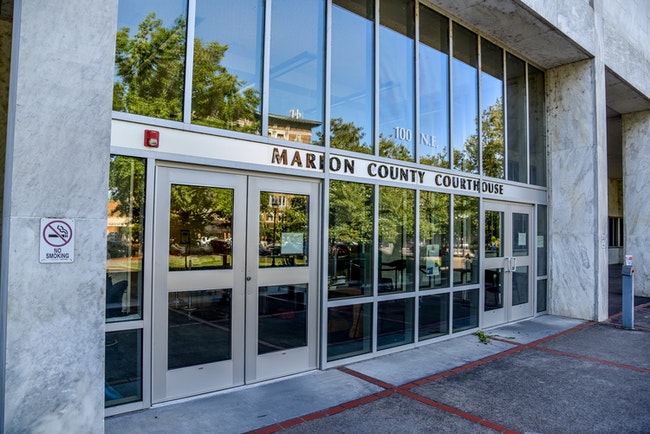 Marion County Courthouse (File/Salem Reporter)
Marion County Courthouse (File/Salem Reporter)
People convicted of state crimes in split jury verdicts in Marion and Polk counties could get new trials or see charges dropped as Oregon responds to a landmark U.S. Supreme Court case.
In April, the U.S. Supreme Court ruled in Ramos v. Louisiana that Oregon’s practice of allowing people to be convicted of serious crimes through 10-2 or 11-1 jury verdicts violates the 6th Amendment of the U.S. Constitution.
Such jury verdicts have been denounced as racist for minimizing the votes of minorities serving on juries. Louisiana has amended its constitution to bar convictions by non-unanimous convictions, leaving Oregon the only state where the practice remained.
Responding to the Supreme Court’s decision, the Oregon Department of Justice has identified 269 cases that will need fresh review. The state’s supreme and appellate courts have been sending pending appeals back to circuit courts, including in Marion and Polk counties. Another list later released by the department, obtained by the Salem Reporter, identified 52 cases in Marion County and 11 in Polk County.
“The prosecutors will get a whole slew of these cases back and they are going to have to decide, do I retry this case, do I try to negotiate a plea agreement or do I just dismiss,” said Marc Brown, chief deputy defender with the state Office of Public Defense Service.
Oregon’s legal community broadly supported abolishing convictions by non-unanimous juries. But now prosecutors, defense attorneys and local courts face difficult work in applying the new standard.
Oregon has allowed non-unanimous jury convictions since 1934, meaning some cases have aging evidence and witnesses that will be difficult, if not impossible, to track down. Victims might also have to relive traumatic instances in instances where prosecutors decide on a new trial.
0n June 4, the Polk County Circuit Court received its first case sent back for reconsideration. In 2018, Adrian J. Ulery was convicted of two counts of first-degree sexual abuse by a split jury. He was sentenced to 75 months in prison and is required to register as a sex offender when he is released.
Court records show that he faces a new trial on the same charges on July 21. He is currently being held in Polk County Jail.
Polk County District Attorney Aaron Felton declined to comment on Ulery’s case.
He said that he and other prosecutors supported doing away with non-unanimous verdicts. But he said deciding whether to retry resource-intensive cases where evidence and witnesses might not be available will be challenging.
“I also recognize how hard this is going to be on the victims that have to go through another trial,” he said. “That is really the tragic part of it.”
He said that retrying the cases could re-traumatize victims. Felton said that reaching out recently to victims a new trial may be coming as some of the most difficult conversations he’s had as a prosecutor.
On Thursday, June 17, the Oregon Court of Appeals sent a case back to Marion County Circuit Court as a result of the Ramos decision. Joshua M. Ballard was sentenced to 90 months in prison in 2018 after a split jury found him guilty of first-degree robbery and unlawful use of a weapon.
The Marion County District Attorney’s Office didn’t respond to a request for comment.
Since May, the Oregon Supreme Court has returned 38 cases to trial courts in response to the Ramos decision. Of those, three have been in Marion County.
On June 4, the Oregon Supreme Court reversed the conviction of Christopher Alexander May and sent the case back to Marion County Circuit Court for further proceeding in light of the Ramos decision. In 2017, May was convicted of first-degree theft and sentenced to probation for 18 months.
The court did the same for David Alan Moles who was sentenced to 75 months in prison after being convicted of first-degree sexual abuse in 2015. In a similar case, Enrique Vera-Medina saw his conviction of first-degree sex abuse reversed and sent back to Marion County Circuit Court. He was sentenced to 75 months in prison.
Brown said that more cases could emerge. He said that defense attorneys are still identifying cases that are affected by the Ramos decision. Another set of cases involve situations where juries were instructed that they could convict by a non-unanimous verdict, said Brown. He said that those instructions could have affected jury deliberations.
Additionally, there are questions about how Ramos applies to situations where a defendant was convicted of some charges by unanimous verdicts and by non-unanimous for other related charges, he said. The Oregon Supreme Court will be considering those issues in August.
SUPPORT SALEM REPORTER’S JOURNALISM – A monthly subscription starts at $5. Go HERE. Or contribute to keep our reporters and photographers on duty. Go HERE. Checks can be sent: Salem Reporter, 2925 River Rd S #280 Salem OR 97302. Your support matters.
Contact reporter Jake Thomas at 503-575-1251 or [email protected] or @jakethomas2009.









